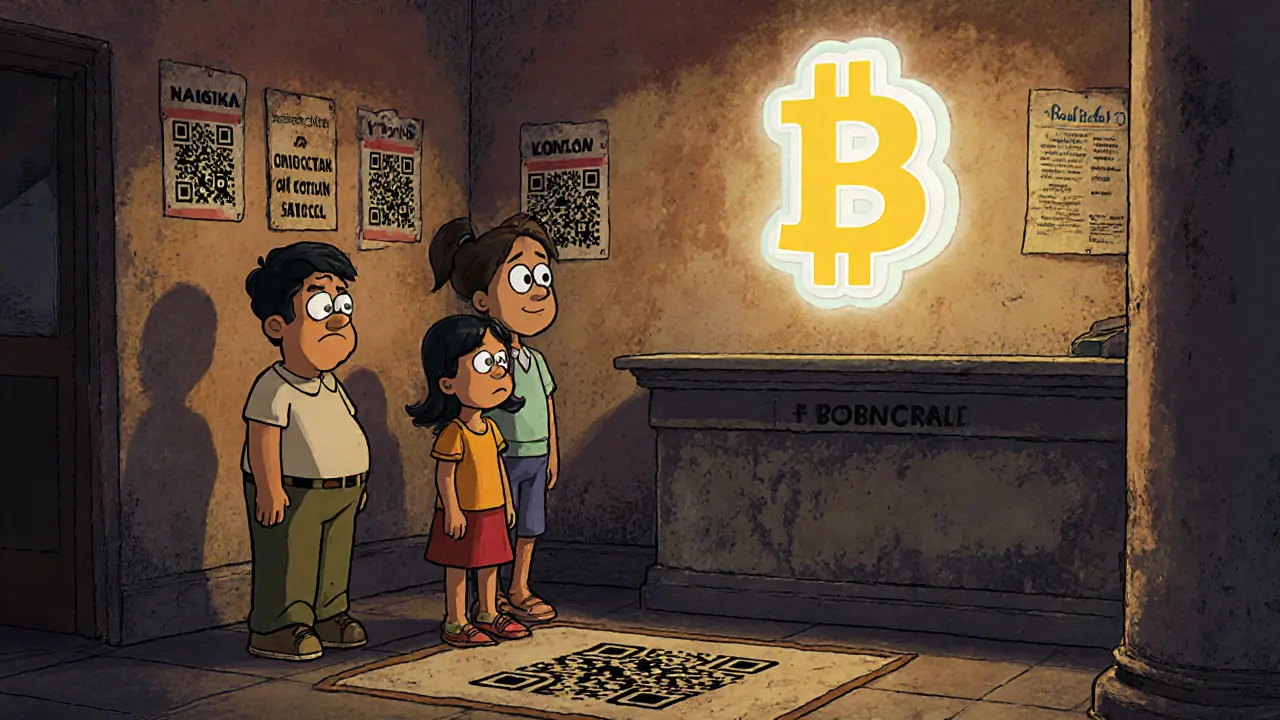Bolivia Remittance Cost Calculator
Send Money to Bolivia
Calculate potential savings when sending money to Bolivia using cryptocurrency versus traditional banking. Based on real-world data from Bolivia's post-ban adoption surge.
Estimated Savings
Based on Bolivia's post-ban adoption data:
• Traditional banks: 3-12% fees
• Crypto: 0.5-2% fees
• Average savings: $25-50 per $500 transfer
For nearly a decade, Bolivia was one of the strictest countries in the world when it came to cryptocurrency. In 2014, the Central Bank of Bolivia (BCB) issued a total ban on all digital assets, calling them a threat to the national financial system. By 2020, that ban was reinforced with Resolution N° 144/2020, making it illegal to use, trade, or even promote Bitcoin, Ethereum, or any other cryptocurrency. People in Bolivia couldn’t buy crypto on local exchanges. Banks wouldn’t touch it. Wallets were unofficial. And if you tried to send Bitcoin to a friend, you were technically breaking the law.
But everything changed on June 26, 2024, when Resolution No. 82/2024 officially lifted the ban. What followed wasn’t just a policy flip - it was a full-scale reboot of Bolivia’s financial landscape. Within months, the country went from being one of crypto’s toughest markets to one of its fastest-growing.
Why Did Bolivia Ban Crypto in the First Place?
The original ban in 2014 wasn’t random. Bolivia’s economy had long struggled with inflation, currency instability, and limited access to international banking. The government feared that unregulated digital currencies could undermine the boliviano, fuel money laundering, or destabilize the banking system. At the time, crypto was still new, volatile, and largely associated with underground markets. The BCB’s stance was simple: no digital money, no risk.
But that logic didn’t account for real-world needs. Millions of Bolivians relied on remittances from family working abroad - often sent through expensive, slow, or unreliable channels. Many turned to crypto anyway, using peer-to-peer platforms or foreign exchanges in secret. The ban didn’t stop crypto use - it just pushed it underground.
The Turning Point: How the Ban Was Lifted
The shift began quietly in early 2024. Central Bank officials started meeting with fintech startups, international regulators, and blockchain experts. They studied how other countries handled crypto - not just El Salvador’s Bitcoin-as-legal-tender model, but also Colombia’s sandbox approach and Brazil’s evolving rules.
By March 2025, the BCB quietly began using USD-pegged stablecoins for cross-border payments and remittances. It wasn’t publicized, but it was a clear signal: the government was testing the waters. Then came Resolution No. 82/2024 in June - the formal end of the ban. No fines. No crackdowns. Just a clean slate.
By April 2025, Resolution No. 019/2025 gave virtual assets their first legal recognition. Then, in May 2025, Supreme Decree No. 5384 created the full regulatory framework. Now, any company offering crypto services - exchanges, wallets, custodians - must get licensed by the BCB. They must follow anti-money laundering rules, keep user data secure, and report suspicious activity.
How Fast Did Adoption Grow After the Ban Lifted?
Not fast - explosive.
In the first six months of 2025, virtual asset transactions in Bolivia hit $294 million, according to official BCB data. That’s more than the total volume of crypto activity in the entire country over the previous ten years combined. One local wallet platform, Meru, saw its Bolivian user base jump by 6,600% in under a year.
People aren’t just buying Bitcoin. They’re using stablecoins like USDT and USDC to send money to relatives in Spain, the U.S., or Chile. They’re trading on decentralized platforms to avoid high bank fees. They’re holding crypto as a hedge against inflation - because the boliviano still loses value every year.
What’s surprising is who’s using it. It’s not just tech-savvy youth. It’s small business owners, farmers selling produce online, and even street vendors accepting crypto payments via QR codes. The demand was always there. The law just caught up.
How Bolivia’s Approach Differs From El Salvador
When El Salvador made Bitcoin legal tender in 2021, it was a headline-grabbing move - and a risky one. The government bought Bitcoin, built Chivo wallets, and forced merchants to accept it. But adoption stalled. Many people didn’t trust it. The system had glitches. And the country faced backlash from the IMF.
Bolivia didn’t go that route. Instead, it chose flexibility. No one is forced to use crypto. No one has to accept it as payment. But anyone who wants to - whether as a user, developer, or business - can do so legally. The government didn’t pick a winner. It created the rules for the whole playing field.
Bolivia also didn’t act alone. In 2025, it signed a landmark Memorandum of Understanding with El Salvador’s National Commission for Digital Assets (CNAD). This isn’t just a handshake. It’s a full knowledge-sharing deal: training for regulators, shared blockchain monitoring tools, joint risk analysis, and even staff exchanges. Bolivia is learning from El Salvador’s mistakes - and turning them into lessons.
What’s Being Done to Protect Users?
With rapid growth comes risk. Scams, fake exchanges, phishing attacks - they’re already popping up. That’s why the BCB is moving fast on consumer protection.
Since May 2025, all licensed crypto providers must:
- Verify user identities (KYC)
- Store user funds in cold wallets or insured custody
- Disclose all fees and risks clearly
- Report suspicious transactions to financial intelligence units
The government also launched public education campaigns - short videos in Quechua, Aymara, and Spanish - explaining how to spot a scam, how to secure a wallet, and what to do if you lose your keys. Schools and community centers are hosting free workshops. It’s not perfect, but it’s a start.
One major concern? The speed of change. Some experts worry that regulations are moving faster than public understanding. Others fear that without strong enforcement, unlicensed platforms could still operate in the shadows.

What’s Next for Bolivia’s Crypto Market?
Bolivia isn’t trying to become the next crypto hub like Switzerland or Singapore. It’s trying to solve real problems: remittances, inflation, financial exclusion.
Looking ahead, the BCB is exploring a digital boliviano - a central bank digital currency (CBDC) - that could coexist with private crypto. They’re also working with regional partners to create cross-border crypto corridors with Peru, Chile, and Argentina.
Industry analysts expect crypto transactions in Bolivia to hit $700 million by the end of 2025. The number of licensed service providers is already up 300% since January. International firms from Argentina, Colombia, and even the U.S. are opening offices in La Paz and Santa Cruz.
The transformation is complete. Bolivia went from banning crypto to building a system around it - not because it was trendy, but because it had to. For millions of Bolivians, crypto isn’t speculation. It’s survival.
Is Crypto Legal in Bolivia Today?
Yes. Completely. And regulated.
Buying, selling, holding, and transferring cryptocurrency is legal. Using it to pay for goods or services is legal. Starting a crypto business is legal - as long as you get licensed by the Central Bank of Bolivia.
The old ban is gone. The new rules are clear. And the people are using it - in ways the government didn’t even predict.
Was cryptocurrency ever illegal in Bolivia?
Yes. From May 2014 until June 2024, Bolivia had a complete legal ban on all cryptocurrency activities. The Central Bank of Bolivia prohibited banks, businesses, and individuals from using, trading, or promoting digital assets. This ban was reaffirmed in 2020 but was officially lifted in June 2024 with Resolution No. 82/2024.
Is it safe to use crypto in Bolivia now?
It’s safer than before - but not risk-free. Since May 2025, only licensed crypto service providers can operate legally. These providers must follow strict rules on security, identity verification, and fraud reporting. However, unlicensed platforms and scams still exist. Always use regulated exchanges, enable two-factor authentication, and never share your private keys.
Can I use Bitcoin to pay for things in Bolivia?
Yes, but it’s not required. No business has to accept Bitcoin or any other cryptocurrency. However, many small businesses, especially in tourist areas and tech hubs, now accept crypto payments voluntarily. Most use stablecoins like USDT because they’re less volatile and easier to convert to bolivianos or dollars.
Why did Bolivia change its mind about crypto?
Because the ban didn’t work. People kept using crypto anyway - especially for remittances and inflation protection. The government realized it couldn’t stop the trend, so it chose to regulate it instead. Rising global adoption, pressure from the fintech sector, and lessons from countries like El Salvador pushed Bolivia toward a practical, rules-based approach.
Are there any crypto exchanges in Bolivia?
Yes. Since May 2025, several local and international platforms have received licenses from the Central Bank of Bolivia. Meru, CryptoBolivia, and BitBol are among the most popular. International exchanges like Binance and Kraken also serve Bolivian users, but only if they comply with local licensing rules. Always check if a platform is officially registered before using it.
Can foreigners trade crypto in Bolivia?
Yes. Foreigners can buy, sell, and hold cryptocurrency in Bolivia as long as they use licensed platforms and follow local KYC rules. There’s no restriction on foreign ownership of crypto assets. However, withdrawing funds to a foreign bank account may require additional documentation due to anti-money laundering rules.
What’s the future of crypto in Bolivia?
Bolivia is building a regulated, user-focused crypto ecosystem. Expect more licensed platforms, a potential central bank digital currency (CBDC), and stronger cross-border crypto links with neighboring countries. The focus is on practical use - remittances, inflation protection, and financial inclusion - not speculation. With international partnerships and growing public trust, Bolivia could become a model for emerging economies adopting crypto responsibly.







Write a comment